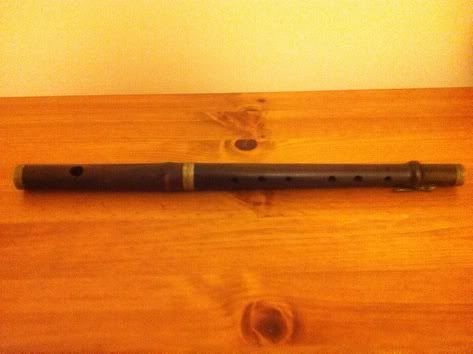Aside from the maker/stamp info, no-one has answered the OP's other queries!

Here goes: I'd need measurements to be sure, but what your picture shows is an absolutely typical mid-late C19th band flute, probably a (treble) Bb "band flute" (if it is c 36-39cm overall length) or just possibly a piccolo (if it is around 28-31cm). Little one-to-six key toots like this were churned out in their thousands between say 1830 and 1930 for use in marching bands from the military to Boys Brigades, works bands and Orange bands. Many were cheap and nasty; some were excellent.
Most were made for a significantly higher pitch standard than modern A=440, and so are of relatively little practical use or value today, especially if like yours they have no tuning slide. Many of the still existing marching bands (mostly in N. Ireland) do still use high pitch instruments, but would be very unlikely to be interested in an old, slide-less one-keyer like this. You can find out more by using this forum's search tool on "band flute" etc. Such flutes are very common on eBay and in junk shops etc. and unless you have an exceptional player at modern pitch, they are worth in the £20-60 price range depending on condition. (You can verify this with a suitably targetted completed listings search on eBay). Most are anonymous (or just marked "London made" or similar), so the specific marque and Liverpool association may add a little interest/value, especially in Liverpool. Certain marques, primarily Hawkes Crown AZ, can command much higher prices - do not be misled by those - even other Hawkes models don't get those prices.
All that said, some of these can be very sweet players and fun to play about with. If it is at modern pitch it can potentially be used in company, though there's not much call for the key of Bb; but if as is most likely it is HP, well, unless you're going to join an HP marching band, it's private, solo, home use only, really (assuming it is in playable fettle).
